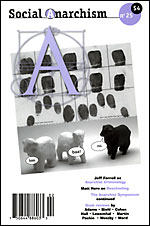Notes from Underground
A zine, for anyone not in the know, is a self-published, self-distributed and explicitly nonprofessional publication. A number of years ago, a friend of mine pasted one together, xeroxed a hundred copies and handed them out at the entranceway to his college campus student union. A few months later, he was receiving letters from across the country, discovering a readership in states he had never visited. Another couple of months and it was listed in Factsheet Five, the now official directory to zine culture, as a poorly recopied but worthwhile politico-paste-up. Unbeknownst to my friend, his work had effortlessly entered a strong and thriving communication network: proof that an alternative, directly democratic media culture was not only viable, but already established. Another month passed, and his mailbox was suddenly inundated with compact disks and promotional packets from every imaginable music corporation: proof that this network was no longer underground, but in the limelight.
This co-option of alternative culture by mainstream conglomerates has been a steady source of critique for a number of years now, particularly within the zine circuit and such zine-inspired publications as The Baffler, the cultural-critical journal for which Stephen Duncombe has written in the past. In the midst of the frequently dire forecasts for the underground in the light of hipster capitalism, Duncombe (himself author of the zine, Primary Documents) has put together a call for a more developed politicization of the do-it-yourself cultural anarchy of the zine world.
Wisely avoiding any academic jargon, Duncombe sketches out a brief background to the zine, one rooted primarily in the sci-fi fanzines of the 1930s and the punk rock zines of the 1970s, but which also finds Thomas Paine and eighteenth century political pamphlets within its lineage. From there, he explores contemporary zine culture and its predominant categories which comfortably blur the personal and the political throughout topics ranging from music to health to sex to conspiracy theory. Duncombe emphasizes the major tropes running through much of underground culture: which include ideas of alienation, anticonsumerism and authenticity: if one has no place (or wants no place) in a consumer culture, then one rejects that culture; if one is relegated to a "loser" status, said loser embraces this status; and if this mantle is accepted, then it must be maintained (and straying can mean rejection all over again). From these attitudes arises the "passionate indifference" of slacker culture: if they want you to join them, leave them (which gets tricky when something like Coke's OK soda manages to market your withdrawal anyway).
Duncombe's criticisms of zine culture and the underground are all on the mark; they define themselves negatively, a process utterly dependent on the culture that is being opposed; the "self-ghettoization" of the zine community and its well-founded fears of co-option has debilitated its potential to affect overground culture in any politicized manner; an individual truly desirous of "alternatives" (a severly degraded word these days) is only left with the choice between the "pure" yet powerless position within the underground, or the "impure" situation of someone like Nirvana's Kurt Cobain, whose suicide Duncombe sees as a result of the underground's "us/them" dichotomization. In the end, "this underground culture… has no politics" – its fate is to be co-opted by what it opposes.
Points well taken. There are also the positive aspects to this culture, of course, which fuel the enthusiasm that inspired the book in the first place. But while those cognizant of the zine scene will no doubt take pleasure (or perhaps outrage at what might be unwanted "exposure") in flipping through the various references to such luminaries as Dishwasher Pete or Riot Grrrl Kathleen Hanna, Duncombe's presentation of what zines have to offer falls a bit short. By repeatedly quoting different sources for the same counter-cultural gripes over mainstream culture and its co-options, the vast and sprawling world of zines ends up looking a bit lackluster and surprisingly limited. There is something about a zine, unlike the average academic book, that doesn't lend itself to dissection or soundbiting. They are ultimate examples of the medium becoming the message: holding a zine in one's hands is holding something personal. To read an extract from it in a paperback immediately does away with its best characteristics, and brings all its shortcomings to light – one of which is that the what some of these zines are saying is not always necessarily as interesting as the fact that they are saying. Approaching some of this source material for its content is like reading a grapevine the way one would a newspaper. As Duncombe states at the opening of his book, the best introduction to zines is through an offering of them. The overview he provides, pared down, might have made for an essential article on the legitimately exciting possibilities and deficiencies of zine and underground culture (although the internet future of all of this is only cursorily referred to in the last two pages); as is, his overview is a thought-out, intelligent, but ultimately overelaborate Verso book that references an enormous amount of diversity and humor without actually managing to display it.

